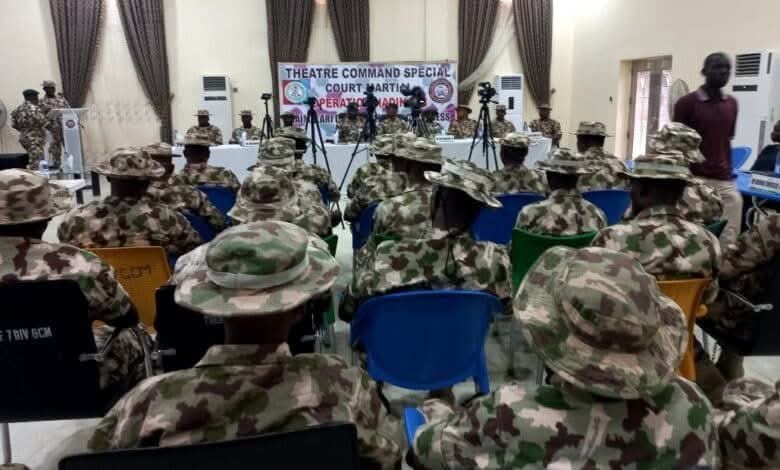Nigerian Soldier Sentenced to Death by Hanging for Girlfriend’s Murder
In a courtroom heavy with tension and disbelief, a General Court Martial (GCM) sitting at the Headquarters of the 82 Division of the Nigerian Army in Enugu delivered a chilling judgment: Private Adamu Mohammed, a soldier of the Nigerian Army, was sentenced to death by hanging for the brutal murder of his girlfriend, Miss Hauwa Ali. This landmark case has not only shocked the Nigerian military establishment but has also reignited urgent conversations about violence against women, the psychological welfare of soldiers, and the thin line between love and lethal obsession.
This story is not just about the irreversible outcome of a romantic relationship turned fatal. It is also about law, justice, discipline, and the mechanisms of accountability in Nigeria’s military institutions.
Private Adamu Mohammed, with service number 21NA/80/6365, had once been considered a relatively quiet and disciplined young soldier in the Nigerian Army. Stationed in Enugu, he reportedly met Hauwa Ali, a 22-year-old student and petty trader, during a community outreach program organized by his unit in late 2023. What began as a seemingly loving relationship took a dark turn over the months, culminating in a horrific act that stunned even seasoned officers.
According to witness testimony during the trial, Mohammed and Hauwa had a volatile relationship, marked by intense jealousy, frequent arguments, and controlling behavior on the part of the soldier. Friends and neighbors of Hauwa testified that she had attempted to end the relationship multiple times but was allegedly threatened by Mohammed, who once reportedly told her, “If I can’t have you, no one else will.”
The fatal incident occurred on the night of December 2, 2024. Hauwa, having finally ended the relationship, was allegedly preparing to move out of her shared apartment in Abakpa, a suburb of Enugu. On that night, Private Mohammed is said to have forcibly gained entry into her home, engaged her in a heated argument, and eventually stabbed her multiple times in the chest and abdomen.
YOU MAY READ
Court Sentences Late Nigerian Gospel Singer Osinachi’s Husband to Death by Hanging
Neighbors rushed in after hearing screams, but by the time they arrived, Hauwa was lying in a pool of her own blood. Private Mohammed was reportedly found at the scene, bloodied and disoriented, clutching the knife. He was immediately arrested by military police and taken into custody pending investigation.
The General Court Martial convened on February 18, 2025, under the directive of the General Officer Commanding (GOC) 82 Division, Major General Oluyemi Olatoye. Chaired by Brigadier General Sadisu Buhari, the GCM panel was composed of senior military officers with backgrounds in legal and operational disciplines.
The trial lasted for over two months and was attended by legal practitioners, military personnel, journalists, human rights observers, and members of the public. The prosecution presented overwhelming evidence, including eyewitness accounts, forensic reports, and Mohammed’s own initial confession.
The court found Private Mohammed guilty of murder under Section 106(a) of the Armed Forces Act, Cap A20, Laws of the Federation of Nigeria 2004. This section defines murder as an offense punishable by death when committed by a service member, particularly under circumstances that violate military codes of conduct and discipline.
In his final judgment, Brigadier General Buhari stated: “The court finds Private Adamu Mohammed guilty beyond reasonable doubt. The crime was premeditated, brutal, and against the ethics of the Armed Forces of Nigeria. The court hereby sentences the accused to death by hanging. May this serve as a deterrent to all those who think they can act with impunity, even in matters of love and passion.”
YOU MAY READ
Enugu High Court Sentences Federal Hospital Directors To Prison For Contempt
In a related case, the GCM also tried and sentenced another soldier, Private Abubakar Yusuf, for armed robbery. He was found guilty of conspiring with civilians to rob a commercial motorcycle rider at gunpoint in Nsukka in October 2024. He was sentenced to 10 years in prison with hard labor.
Though unrelated to the murder case, the sentencing of Yusuf alongside Mohammed highlighted the broader issue of indiscipline and criminal conduct among some members of the armed forces — an issue that the Nigerian Army leadership says it is determined to root out.
The reaction to the court’s verdict has been a mix of satisfaction, sadness, and outrage — not over the sentence, but over the fact that a young woman had to lose her life before such justice could be seen.
Women’s rights groups, including the Federation of Female Lawyers (FIDA) and the Women’s Aid Collective (WACOL), welcomed the judgment. In a joint press release, the groups stated: “This is a landmark ruling in a country where justice for female victims of intimate partner violence is often elusive. We commend the military for showing that love does not excuse murder and that uniforms do not shield criminals from consequences.”
Social media was awash with hashtags such as #JusticeForHauwa, #MilitaryDiscipline, and #EndFemicide, as users called for broader reforms in how the military screens and supports its personnel, especially in managing trauma, emotional stability, and relationship stress.
One X (formerly Twitter) user, @VoiceOfNaija, wrote: “Every soldier should be trained not just in war tactics but in emotional intelligence. Rest in peace, Hauwa. Your death won’t be in vain.”
Another user, @ZikoraLaw, tweeted: “It is refreshing to see the military take murder seriously within its ranks. Now do the same for war crimes and civilian abuses too.”
Hauwa Ali was a second-year student of Business Administration at a polytechnic in Enugu. Described by classmates as kind, ambitious, and resourceful, she also sold fashion accessories part-time to support her schooling. She hailed from Maiduguri, Borno State, but had relocated to Enugu for safety and education after losing her father to insurgency violence.
“She escaped Boko Haram only to be killed by someone she loved,” said her close friend Zainab Ibrahim in a tearful interview. “She deserved better. She wanted to open a boutique after graduation. She used to say, ‘One day, I’ll make it big.’”
Her funeral, held in Enugu, was attended by fellow students, family members, and women’s rights activists. Many wore black with red ribbons tied around their wrists — a symbol of female resistance against gender-based violence.
The Nigerian military is no stranger to scandal. Over the years, there have been multiple reports of domestic abuse, extrajudicial killings, and sexual misconduct by serving personnel. While these incidents are not representative of the entire institution, they have raised legitimate concerns about the psychological health of soldiers and the lack of internal checks.
YOU MAY READ
Court Sentences UNIUYO Professor to Three Years Imprisonment for Electoral Fraud: A Deep Dive into the Case, Legal Ramifications, and Wider Implications
Defense analyst and retired Colonel Godwin Eboh told this reporter, “The military needs to invest heavily in psychological evaluation and counseling services. Most of our soldiers are products of trauma — either from combat zones or dysfunctional backgrounds. When they snap, it’s often deadly.”
He added, “We must treat emotional stability as part of national security. A soldier who cannot control his temper is a walking time bomb.”
Unlike civilian courts, the General Court Martial operates under military law, which allows for swift and firm penalties for offenses considered disgraceful or harmful to the integrity of the Armed Forces. While the civilian legal system has often been criticized for delays, military trials — though less transparent — are often speedier.
According to Section 106 of the Armed Forces Act, “Any person subject to service law who commits murder shall, on conviction by a court-martial, be sentenced to death.” The law does not permit plea bargains in murder cases within military courts.
Legal scholar Professor Chijioke Emeka explains, “Once an offense is classified as ‘capital’ and the evidence is clear, the military has no room for leniency. However, the judgment is subject to confirmation by the Army Council or the Commander-in-Chief before execution.”
While Hauwa’s family is grieving her loss, Mohammed’s family is equally devastated. His older sister, Amina Mohammed, broke down while speaking to reporters: “Adamu was our hope. We never imagined he could do something like this. He has shamed us. But he is still our blood. I only wish he had gotten help.”
Family members say that Adamu had shown signs of emotional distress for months but received no formal counseling. They believe the pressures of military service, combined with personal loss and poor emotional coping mechanisms, may have contributed to his breakdown.
Since assuming command in 2024, Major General Oluyemi Olatoye has emphasized the importance of discipline, professionalism, and respect for civilian rights within the 82 Division.
In a brief statement after the verdict, the GOC stated: “The Nigerian Army does not condone lawlessness. This judgment reinforces our commitment to upholding justice and protecting human dignity, both inside and outside the barracks.”
Sources within the division suggest that mandatory psychological assessments may soon be introduced for all personnel, especially those involved in front-line duties or those returning from combat zones.
The sentencing of Private Adamu Mohammed to death by hanging is a grim reminder of what happens when power, love, and unresolved emotional turmoil collide. It is a story of a young woman whose life and dreams were snuffed out by someone sworn to protect the nation. It is also a cautionary tale about the dangers of unchecked emotional instability among armed personnel.
As Nigeria continues to grapple with rising cases of gender-based violence and questions about justice reform, this case stands out — not just because of the high-profile nature of the defendant, but because it signals a rare moment when justice, albeit tragic, was visibly served.
The military may have delivered a strong message. But the real test lies ahead: Will reforms follow? Will soldiers be given the mental health tools they need? And will the love for a woman, or the loss of her, ever again be allowed to turn into a death sentence?
Only time will tell.





